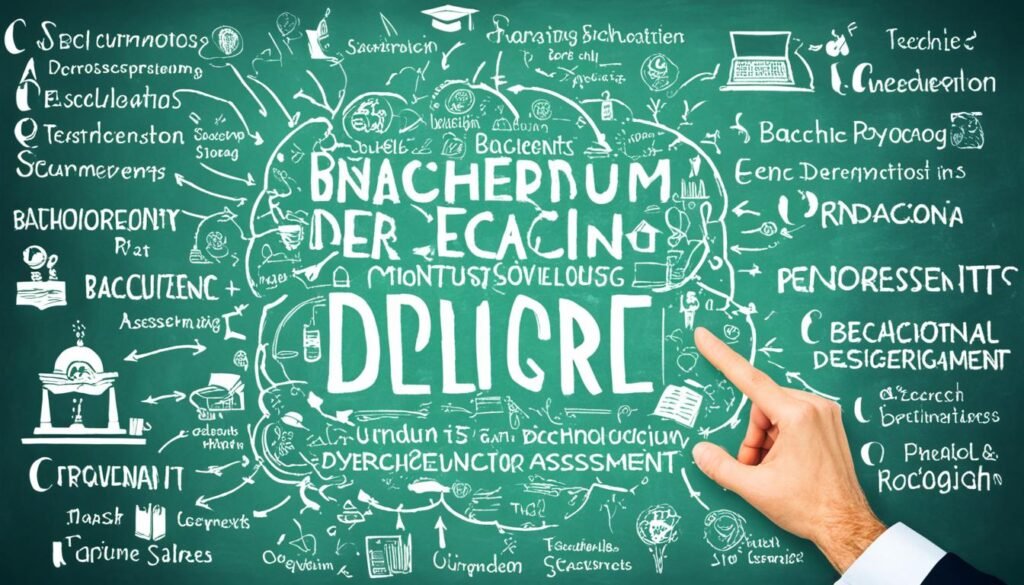Earning a bachelor’s degree is essential for aspiring educators. There are different paths to consider, such as specializing in early childhood education, elementary teaching, or a specific subject area for secondary teaching. Regardless of the chosen specialization, the first step is to complete a bachelor’s degree in education. This article will explore the core courses that are typically included in a Bachelor Degree in Education program and provide an overview of the program requirements.
Also Read: Exploring Campus Life At Caldwell University
Key Takeaways:
- Bachelor degree in education is a fundamental requirement for aspiring educators.
- Specializing in early childhood education, elementary teaching, or a specific subject area for secondary teaching offers different career paths.
- Core courses in a Bachelor Degree in Education program provide a foundation in teaching principles.
- Completing a bachelor’s degree in education is the first step towards a rewarding teaching career.
Stay tuned to learn more about the specific courses and requirements in a Bachelor Degree in Education program!
Options for Bachelor Degree in Education Specializations
A Bachelor Degree in Education program offers various options for specialization, allowing future educators to prepare for specific teaching roles. These specializations focus on different areas of education and cater to the diverse needs of students at different levels. Whether you have a passion for early childhood education, elementary education, or instruction in a specific subject area for secondary teaching, there is a specialization that suits your interests and career goals.
Also Read: How Does Brandman University Support Career Development And Advancement?
Here are some common specializations available in Bachelor Degree in Education programs:
- Early Childhood Education: This specialization focuses on teaching children from birth to around eight years old, during their crucial developmental years. It equips educators with the knowledge and skills needed to create engaging and developmentally appropriate learning experiences for young learners.
- Elementary Education: With a specialization in elementary education, educators are equipped to teach students in the early grade levels, typically from kindergarten to fifth or sixth grade. They learn effective teaching strategies, curriculum development, and classroom management techniques tailored to the needs of elementary school students.
- Secondary Teaching: This specialization allows educators to specialize in a specific subject area, such as English, mathematics, science, social studies, or foreign languages, for teaching in middle schools and high schools. They gain in-depth knowledge of their chosen subject area and learn effective instructional methods to engage and inspire secondary school students.
These specializations within a Bachelor Degree in Education program play a crucial role in shaping educators for their future teaching careers. They provide focused coursework and practical experiences that align with the specific needs and demands of each specialization. Whether you have a passion for early childhood education, elementary education, or secondary teaching in a specific subject area, pursuing a specialization will help you excel in your chosen field.
When selecting your specialization, consider your interests, strengths, and the age group or subject area you are most passionate about. Research each specialization’s curriculum, practicum opportunities, and career prospects to make an informed decision that aligns with your goals.
Table: Comparison of Specializations in Bachelor Degree in Education Programs
| Specialization | Description | Coursework | Career Opportunities |
|---|---|---|---|
| Early Childhood Education | Focus on teaching children from birth to around eight years old | Child development, early literacy, play-based learning | Preschool teacher, kindergarten teacher, early intervention specialist |
| Elementary Education | Teaching students in the early grade levels, typically from kindergarten to fifth or sixth grade | Curriculum development, classroom management, subject-specific pedagogy | Elementary school teacher, curriculum specialist, reading specialist |
| Secondary Teaching | Specialization in a specific subject area for teaching in middle schools and high schools | Subject-specific pedagogy, curriculum design, student assessment | Subject area teacher, high school counselor, education consultant |
Admission Requirements for Bachelor Degree in Education Programs

When pursuing a Bachelor Degree in Education, it is essential to be aware of the admission requirements for your chosen program. Admission into these programs is often competitive, and meeting the necessary criteria is crucial. Below are some common admission requirements for Bachelor Degree in Education programs:
- Completion of Core Prerequisites or Transferable Associate’s Degree: Many programs require students to have completed specific core prerequisites or have an associate’s degree that is transferable to a four-year institution.
- Achievement of a Minimum Cumulative Grade Point Average (GPA): Maintaining a good academic standing is important, and programs may require a minimum cumulative GPA to be considered for admission.
- Supervised Teaching or Work Experience: Some programs may require applicants to have prior experience working with the desired grade level or participate in supervised teaching opportunities.
- Passing ACT, SAT, or State Skills Tests: Standardized tests play a role in the admission process. Students may need to achieve a certain score on tests such as the ACT, SAT, or state-specific skills exams.
- Additional Requirements for International Students: International students may have additional requirements such as taking the TOEFL exam to demonstrate English language proficiency and providing educational credential evaluations.
It is crucial to carefully review the admission requirements for each Bachelor Degree in Education program you are interested in. Understanding the prerequisites and preparing ahead of time will increase your chances of admission. Meeting these requirements ensures that you are on the right track to pursuing your passion for education.
Also Read: How Does Rivier University Support Student Success?
Duration and Options for Bachelor Degree in Education Programs

Most Bachelor Degree in Education programs typically require approximately four years of full-time study to complete. This duration allows students to acquire a comprehensive understanding of teaching principles, pedagogy, and subject-specific knowledge. However, there are alternative options available for those looking to expedite their studies or require more flexibility due to work or other obligations.
Accelerated Programs
Accelerated programs offer an intensified curriculum, allowing ambitious students to complete their Bachelor Degree in Education within three years instead of the traditional four-year timeframe. These programs are designed to provide a condensed and focused learning experience without compromising the quality of education. They offer a great opportunity for dedicated individuals who are eager to enter the teaching profession at a faster pace.
Online Programs
Online programs have gained popularity in recent years, offering students the convenience and flexibility to pursue their Bachelor Degree in Education from the comfort of their own homes. Online programs provide self-paced learning options and asynchronous coursework, enabling students to study at their own convenience. This format is particularly beneficial for individuals who need to balance their studies with work or other commitments. Online programs allow students to tailor their education to fit their unique schedules, making it an excellent choice for those seeking a more flexible approach to obtaining their bachelor’s degree.
Also Read: Exploring The Legacy: A Comprehensive History Of Lewis University
Both accelerated programs and online programs provide valuable alternatives to the traditional four-year degree program. These options cater to the diverse needs of aspiring educators, allowing them to choose a pathway that aligns with their personal circumstances and goals.
Comparison: Duration and Flexibility of Programs
| Program Type | Duration | Flexibility |
|---|---|---|
| Traditional Four-Year Program | Approximately 4 years | Fixed schedule |
| Accelerated Program | Approximately 3 years | Intensive, focused curriculum |
| Online Program | Varies (typically 3-4 years) | Flexible, self-paced learning |
As shown in the comparison table, students have the option to choose a program that best meets their individual needs. Traditional four-year programs provide a comprehensive education in a fixed timeframe, while accelerated programs offer a shorter but more concentrated learning experience. Online programs offer the most flexibility, allowing students to learn at their own pace and create a customized study schedule.
Ultimately, the choice between these options depends on an individual’s preferences, goals, and availability. Regardless of the program type, all Bachelor Degree in Education programs aim to equip students with the necessary skills and knowledge to succeed in their future teaching careers.
Curriculum and Accreditation for Bachelor Degree in Education Programs

When pursuing a Bachelor Degree in Education, students can expect a comprehensive curriculum that encompasses both general education courses and specialized education coursework. This well-rounded approach ensures that future educators acquire a broad liberal arts education while also developing the necessary teaching knowledge and pedagogy skills.
Also Read: Elevating Education: The Significance Of Degree Courses
The general education courses cover a range of subjects, including mathematics, sciences, humanities, social sciences, and English composition. These courses provide a solid foundation of knowledge and critical thinking skills, essential for effective teaching and navigating the diverse needs of students.
The specialized education coursework focuses on the principles of teaching, classroom management, educational psychology, curriculum development and implementation, assessment, and more. Students gain insights into the best practices and theories that inform modern pedagogy, enabling them to create engaging, inclusive, and effective learning environments.
When choosing a Bachelor Degree in Education program, it is vital to ensure that the program holds accreditation from a reputable source. Accreditation serves as a mark of quality and confirms that the program meets the standards set by an accrediting agency. For education programs, regional accrediting agencies such as the Southern Association of Colleges and Schools Commission on Colleges (SACSCOC) or professional agencies like the Council for the Accreditation of Educator Preparation (CAEP) provide this endorsement.
Accreditation offers several benefits to students. First, it verifies that the program meets high academic standards and provides a quality education. Second, it ensures that the program is eligible for federal financial aid, making education more accessible and affordable for students. Lastly, accredited programs generally enjoy better reputation and recognition, increasing graduates’ opportunities for employment and professional advancement.
Benefits of Accreditations for Students:
- Ensures a quality education
- Eligibility for federal financial aid
- Enhanced employment and professional opportunities
By enrolling in an accredited Bachelor Degree in Education program, aspiring educators can have confidence in the program’s rigor and relevance, helping them to develop the knowledge and skills necessary for a successful teaching career.
| Benefits of Accreditation for Bachelor Degree in Education Programs | Accrediting Agencies |
|---|---|
| Ensures program quality | Regional accrediting agencies (e.g., SACSCOC) |
| Eligibility for federal financial aid | Council for the Accreditation of Educator Preparation (CAEP) |
| Enhances employment and professional opportunities |
Student Teaching Experience in Bachelor Degree in Education Programs

One of the key components of a Bachelor Degree in Education program is the student teaching experience. This hands-on opportunity allows aspiring teachers to apply their knowledge and gain practical teaching skills in a real classroom setting.
Student teaching is often a requirement for aspiring teachers in many states as it provides the necessary supervised teaching experience for certification or licensing. During this designated period, students are placed in a classroom where they actively participate in lesson planning, instruction, and classroom management under the guidance and mentorship of an experienced teacher.
The student teaching experience is invaluable for future educators as it allows them to develop and refine their teaching techniques, classroom management strategies, and communication skills. It provides an opportunity to work with diverse student populations, adapt to different learning styles, and address individual needs within a supportive and supervised environment.
By participating in student teaching, students can also establish connections with professionals in the field and gain valuable insights into the day-to-day realities of teaching. This experience not only prepares them for the challenges they may encounter in their teaching career but also provides a strong foundation for continued growth and development as educators.
Benefits of Student Teaching Experience:
- Gain practical teaching skills
- Apply theoretical knowledge in a real classroom
- Develop effective teaching techniques
- Refine classroom management strategies
- Learn to address individual student needs
- Build connections with experienced teachers
- Understand the realities of teaching
- Prepare for certification or licensing requirements
It is important for aspiring teachers to ensure that the Bachelor Degree in Education program they choose includes access to student teaching opportunities. This experience plays a crucial role in their professional development and sets the stage for a successful teaching career.
Overall, the student teaching experience in a Bachelor Degree in Education program provides future educators with the practical skills, knowledge, and confidence needed to excel in the classroom. It serves as a bridge between theoretical coursework and real-world teaching, preparing aspiring teachers for the challenges and rewards of a fulfilling career in education.
Coursework Overview in Bachelor Degree in Education Programs

The coursework in a Bachelor Degree in Education program provides a comprehensive foundation for future educators. It covers various areas relevant to teaching, ensuring that graduates are well-prepared to enter the teaching profession. Below is an overview of some common courses included in Bachelor Degree in Education programs:
1. Instructional Strategies
This course explores effective teaching methodologies and strategies that promote student engagement and learning. Topics may include lesson planning, instructional delivery techniques, classroom management, and the integration of technology in teaching.
2. Child and Human Development
This course focuses on understanding the physical, cognitive, social, and emotional development of children and adolescents. It examines theories and factors that influence development, helping future educators tailor instruction to meet the diverse needs of their students.
3. Mathematics Concepts
Mathematics is a fundamental subject in education. This course provides in-depth knowledge of mathematical concepts and strategies for teaching math effectively. It covers areas such as number operations, algebraic thinking, geometry, and data analysis.
4. English Language Learning and Literacy Integration
This course equips future educators with the skills to support English language learners and promote literacy development in their classrooms. It covers strategies for language acquisition, reading comprehension, writing instruction, and fostering a love for literature.
5. Educational Curriculum Creation and Modification
This course examines curriculum design principles and methods of creating and adapting curriculum to meet students’ educational needs. It emphasizes aligning curriculum with educational standards, integrating interdisciplinary approaches, and promoting inclusive education.
6. Student Assessment and Evaluation
Assessment is an integral part of teaching. This course covers various assessment and evaluation strategies, including formative and summative assessments, standardized testing, performance-based assessments, and data analysis to inform instructional decisions.
7. Classroom Management
Effective classroom management is essential for creating a positive and productive learning environment. This course provides future educators with practical strategies for establishing rules and routines, managing behavior, promoting student engagement, and fostering a supportive classroom community.
“Education is not the learning of facts, but the training of the mind to think.” – Albert Einstein
The specific coursework within a Bachelor Degree in Education program may vary depending on the chosen specialization. Educators specializing in early childhood education, elementary education, or specific subject areas for secondary teaching may have additional coursework tailored to their specific area of expertise.
The coursework in a Bachelor Degree in Education program provides a strong foundation for aspiring educators, equipping them with the knowledge and skills necessary to make a positive impact on students’ lives. From instructional strategies and child development to subject-specific teaching methods and classroom management techniques, this coursework ensures that graduates are well-prepared for the challenges and rewards of a teaching career.
Career Opportunities with a Bachelor Degree in Education

A Bachelor Degree in Education offers numerous career opportunities in the field of teaching. Graduates can pursue fulfilling careers as teachers, utilizing their knowledge and skills to make a positive impact on students’ lives. Depending on their interests and aspirations, individuals with a bachelor’s degree in education can explore various pathways in the education sector.
Many graduates choose to work as teachers in their chosen specialization. Whether it’s early childhood education, elementary education, or secondary teaching in a specific subject area, a bachelor’s degree in education provides a solid foundation for entering the classroom. Teaching offers the chance to inspire and educate future generations, fostering intellectual growth and shaping young minds.
Some graduates may choose to further specialize in specific subjects by earning endorsements or pursuing additional education. By deepening their knowledge in a particular subject area, such as mathematics, science, or English, educators can become experts in their field and provide specialized instruction to students.
For those who aspire to take on educational leadership roles, pursuing a master’s degree in education can open doors to career advancement. Educational leadership positions, such as principal, instructional coordinator, or curriculum specialist, require strong leadership skills, an understanding of educational policies, and the ability to drive positive change within educational institutions. A master’s degree in education provides the necessary knowledge and credentials to take on these leadership roles.
In addition to traditional teaching roles, individuals with a Bachelor Degree in Education can also explore career opportunities outside of the classroom. Public sector organizations and non-profit organizations often hire individuals with educational backgrounds to work in roles related to educational program development, policy analysis, or education advocacy. Counseling is another field where individuals with a background in education can make a difference, providing guidance and support to students and their families.
Overall, a Bachelor Degree in Education opens up a wide range of career opportunities in teaching and related fields. By pursuing a career in education, individuals can contribute to the growth and development of future generations, making a lasting impact on society.
To provide a comprehensive overview of career opportunities, below is a table showcasing various career paths that individuals with a Bachelor Degree in Education can pursue:
| Career Path | Description |
|---|---|
| Teacher | Work as a teacher in a chosen specialization, such as early childhood education or elementary education. |
| Subject Specialist | Specialize in a specific subject area, such as mathematics or science, to provide specialized instruction. |
| Educational Leadership | Pursue a master’s degree in education and take on leadership roles in educational institutions, such as principal or instructional coordinator. |
| Educational Program Development | Work in public sector organizations or non-profit organizations to develop educational programs and initiatives. |
| Education Advocacy | Advocate for educational policies and reforms to improve the quality of education. |
| Counselor | Provide guidance and support to students and their families. |
Bachelor’s Degree Program in Education Specialties
A Bachelor’s Degree Program in Education Specialties offers comprehensive training in various aspects of education, including teaching methodologies, curriculum development, classroom management, and educational psychology. Students delve into specialized areas such as special education, early childhood education, or literacy instruction. This program equips graduates with the knowledge and skills needed to excel as educators in diverse settings, from elementary schools to adult education programs. Through coursework, practical experiences, and internships, students gain a deep understanding of educational theory and practice, preparing them to make a positive impact on learners’ lives and contribute effectively to the field of education.
Learn About a Career in Education
Exploring a career in education offers a pathway to shaping future generations and fostering lifelong learning. Educational careers span from teaching and administration to curriculum development and educational technology. Professionals in this field inspire, motivate, and guide students toward academic success and personal growth. With roles in schools, colleges, nonprofits, and government agencies, educators have diverse opportunities to make a difference. Embracing continuous learning and adaptability, educators navigate evolving educational landscapes and address diverse student needs. Pursuing a career in education means embracing a fulfilling journey of mentorship, innovation, and advocacy for equitable access to quality education.
Why Get a Bachelor of Education Online?
Getting a Bachelor of Education online offers flexibility and accessibility, allowing individuals to pursue their passion for teaching while balancing other commitments. Online programs provide convenience through self-paced learning, enabling students to study from anywhere with internet access. They offer diverse specializations, catering to various educational interests and career goals. Additionally, online platforms often incorporate interactive tools and multimedia resources, enhancing the learning experience. For those already working in education or related fields, online study allows for professional advancement without disrupting their careers. Overall, earning a Bachelor of Education online offers a convenient, adaptable, and enriching pathway to becoming a qualified educator.
Also Read: Navigating General Education Requirements Easily
Conclusion
Earning a Bachelor Degree in Education is the first step towards a successful teaching career. This comprehensive program equips individuals with the necessary knowledge and skills to excel in various teaching roles. Through specialized specializations, students can focus on specific areas of instruction, such as early childhood education, elementary teaching, or secondary teaching in a specific subject area.
Upon completion of a Bachelor Degree in Education, graduates open doors to a wide range of career opportunities in the field of education. Whether it’s fulfilling their passion for teaching in a classroom setting or aspiring to take on educational leadership roles, a bachelor’s degree in education serves as a valuable asset. With this degree, educators can make a positive difference in the lives of their students, fostering their growth and success.
If you’re passionate about shaping young minds and making a lasting impact on future generations, pursuing a bachelor’s degree in education is a worthwhile choice. Start your journey towards a fulfilling teaching career today by enrolling in a Bachelor Degree in Education program.
FAQs
Q: What are the core courses included in a Bachelor Degree in Education program?
A: The core courses in a Bachelor Degree in Education program typically cover subjects like education foundations, teaching strategies, classroom management, educational psychology, curriculum development, and assessment methods.
Q: What career opportunities can a Bachelor of Education degree lead to?
A: A Bachelor of Education degree can lead to various career opportunities such as classroom teaching, educational administration, curriculum development, educational consulting, and instructional design.
Q: Can I pursue an Education degree online?
A: Yes, many institutions offer Bachelor of Education programs online to cater to the needs of students who prefer flexible learning options.
Q: What are the licensure requirements for becoming a teacher with a Bachelor of Education degree?
A: Licensure requirements vary by state or country, but typically include completing a Bachelor of Education program, passing required exams, and fulfilling supervised teaching experience.
Q: How long does it take to earn a Bachelor of Education degree?
A: A Bachelor of Education degree usually takes four years to complete, provided the student is enrolled full-time and follows a standard academic schedule.
Q: What is the significance of earning a teaching license along with a Bachelor of Education degree?
A: Earning a teaching license is essential for individuals looking to work as professional educators as it demonstrates that they have met the required standards to teach in a specific subject or grade level.
Q: Are there online Bachelor of Education programs that offer teaching licensure?
A: Yes, there are online Bachelor of Education programs that not only provide the academic coursework but also help students meet the licensure requirements to become certified teachers.





